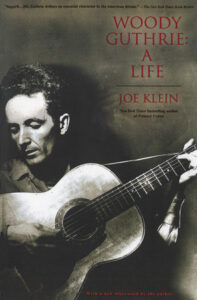Each month, we ask a member of faculty to tell us about one book that played an outsized role in making them who they are today. This month, we invite Director of Writing & Publishing Gillian Turnbull to share her Words to Live By.
What book have you chosen?
 Woody Guthrie: A Life by Joe Klein
Woody Guthrie: A Life by Joe Klein
When did you first read this book?
In my last year of my undergraduate degree, which would have been around 1999 or 2000.
Was it a book that you read quickly or did you take your time reading it?
I think I read it fairly quickly because it was one among many books I was reading for my honours thesis.
What was it about the book that first stood out to you?
There were two things:
First, the compassion with which Joe Klein treated his subject. There was something so loving in his words about Guthrie; the way he wrote as if Guthrie was a close friend. For me, this has remained a model of how to write not only biographies, but also stories about musicians and their work.
Second, Guthrie’s life and work. In particular, I was taken with his commitment to social change, especially in labour reform. His recognition that music could play an important role in helping us understand and communicate about pressing issues shaped everything I thought about music going forward.
Have you reread this book? If so, did you get something different from it on rereading?
Yes, I have reread it twice. And yes, my understanding and appreciation of Guthrie grows each time. I remember certain scenes vividly: the house fire that took his young daughter’s life; the brief but memorable description of Guthrie and his wife Marjorie holding each other, their tiny vulnerable frames dwarfed by the large bed; the labour rallies; his rapid decline and the support system around him (Guthrie passed away from Huntington’s disease).
 How did this book shape you?
How did this book shape you?
It changed the trajectory of my whole life. Though I was young, I was already a unionized worker. I became a labour activist, following and participating in labour reform, eventually working as a steward in later years. I spent nearly 30 years in unionized environments, and learned everything I knew about them and the union movement from studying Guthrie and his fellow musicians.
The book also made me an ethnomusicologist. Until I read the book, I was a classically trained musician, en route to becoming a musicologist studying composers of the 19th century. But my love of folk music kept calling to me, and Klein’s book made me realize I could change my field of study. Ethnomusicology is the study of the socio-cultural conditions around music making, often with a focus on communities of musicians, individual stories and small scenes. After I read that book and wrote my honours thesis, I went on to write about music scenes and acts I loved, with a view to eventually publishing that work for a broader audience.
What do you think it is about this book that made such an impact?
As many young people are, I was excited about the new ideas I discovered in the book, and the history behind so many things that were important to me: folk music, the activity and social connections in music scenes, and working conditions for the average person under capitalism. I was so taken with the stories in the book that I spent hours upon hours in the university library digging up anything I could find on the topic. And I just ran with it—the book married my two loves of folk music and writing, and I ended up doing just that, writing about music, for the next 25 years.
Who do you think should read this book?
Right now, everyone should. It’s a remarkable story of an individual, with so many things working against him, effecting change. He was born poor and lived through the Dust Bowl and the Depression, and leveraged his direct experience of being lower class into massive social change. As our economic support system falters—and fails many of us—we need to know we can not only demand better from our institutions, but we can do it together, like Guthrie and his fellow musicians did.

